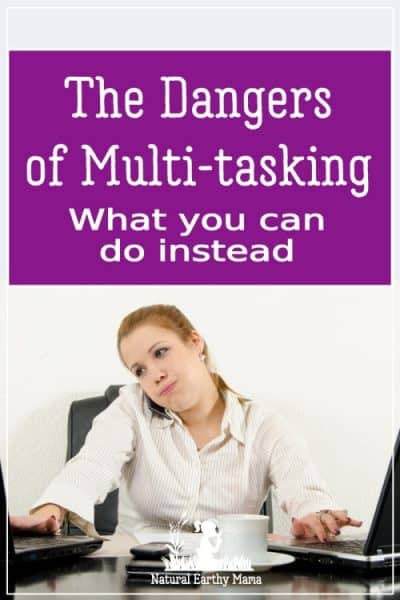 In yesterday’s post, I shared with you why it’s better to concentrate on just one thing at work if you want to feel calmer. I gave you a few examples of the benefits of single-tasking.
In yesterday’s post, I shared with you why it’s better to concentrate on just one thing at work if you want to feel calmer. I gave you a few examples of the benefits of single-tasking.
Today, I’d like to elaborate on that a bit. Multi-tasking truly is becoming an epidemic in our society that’s causing stress, lost productivity, and less quality work, among other issues.
Please read: This information is provided for educational purposes only and is not intended to treat, diagnose or prevent any disease. We encourage you to make your own health care decisions in partnership with a qualified health care professional.
This post contains affiliate links, this means at no extra cost to you, we make a commission from sales. Please read
our Disclosure Statement
This isn’t just my opinion. Research shows that there are dangers of multi-tasking. Let’s take a look at some of the ways this pressure to do more in less time can hurt you, both physically and mentally.
This post is part of a FREE 30 days to Creating Calm Challenge. If you would like to join us we would love to have you!!
Join us here.
Increased Distractibility
It’s been demonstrated that people who multi-task the most are actually more distractible than those who do so less frequently.
It’s believed that the constant rapid switching from task to task your brain must engage in through multi-tasking can lead to difficulty in determining which interruptions are important and which aren’t.
Therefore, you’ll find yourself being pulled away by any minor distraction.
More Physical Accidents
The distractibility of multi-tasking can have real, physically harmful results. When your mind is unable to concentrate fully on a task, it’s easy to make careless errors.
In fact, one study of New York City pedestrians found a significant percentage of 1400 studied reported that they were using their cellphones when they were hit.
Impaired Memory
Quickly moving from one activity to another on a regular basis can lead to memory problems. The reason is because this constant switching disrupts short-term memory.
It can also cause you to miss noticing details that might be important, damaging recall.
Potential Overeating
Many of us multi-task while eating. After all, it doesn’t take a lot of cognitive effort to eat, so why not get something else done at the same time?
Did you know that making this type of multi-tasking a habit could be detrimental to your health? Your brain doesn’t always process just what and how much you’ve eaten.
As a result, this makes it easy to not notice when you’re full and to overeat.
Damaged Relationships
Multi-tasking takes attention away from the person you’re with. Such actions can be perceived as hurtful and rude. It also impairs actual communication.
If you find yourself paying attention to other things while spending time with the people who are important to you, it’s a wise idea to try to limit such behavior, especially if you truly value your relationships.
This also includes your children. Talking to a child while distracted with something else shows the child that they aren’t as important as the thing you are also working on.
Put it down for a minute and talk to them face to face for a while.
These are a few of the ways in which multi-tasking can actually hurt you, along with making you feel stressed out. Keep them in mind the next time you’re tempted to try to do two things at once.
